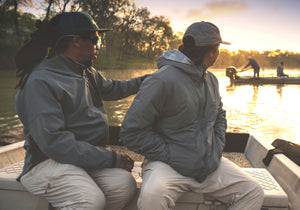Behind every famous fishery lies a dedicated river keeper, balancing the weight of history with the urgent challenges of today. From Derbyshire’s storied Haddon Estate and the world-renowned River Test, Head Keepers Jan Hobot and Si Fields share what it means to protect and preserve these waters.
Jan Hobot, Head Keeper at Haddon Estate

The Peacock Fly Fishing Club has such a storied history - how do you balance preserving tradition with the practical challenges of modern river keeping?
What drew me to come and work at Haddon Estate (aka The Peacock Fly Fishing Club) was that it was being run as a wild trout fishery. The decision to go wild was made in 2003, with the 100 years before that being run as a stocked trout fishery. This was one of the biggest tradition changes on a fishery at the time. For me it is now very important to keep the wild trout system going, as this is now the tradition that needs to be kept most in the years to come! Our river keeping techniques now prioritise towards the goal of clean healthy rivers full of habitat for wild fish and invertebrates to thrive.
What makes the rivers of Derbyshire, and the waters you look after, distinct from other trout streams in the UK?
Within a three-mile radius of Haddon Hall I am fortunate to look after four very different rivers. A freestone river, a limestone river, and two true limestone rivers. These rivers are all very different in character for the area, let alone the country. Different types of bankside soil, water chemistry, industrial influences, water temperatures, invertebrate numbers and fish species. Once you start looking past just looking for trout you notice so much more and see how unique these rivers are.

If someone shadowed you for a day, what would surprise them most about the realities of being a head river keeper?
If someone shadowed me for the day, I think they would actually be surprised at how much responsibility we have to protect the rivers. To be a modern-day river keeper you have to be savvy in so many areas. You have to be well read on conservation practises for different species of fish, birds, mammals, flowers, inverts, grasses and tree’s. You need to be well versed in law to take on water companies, farmers, poachers or anyone damaging the rivers. You have to be a great communicator to engage anglers and members of the public in order to speak about the good work we do catchment wide. Long gone are the days of just providing fishing for anglers. The work we do really makes a positive impact.

Looking ahead, what do you see as the biggest opportunities to ensure Derbyshire’s rivers remain healthy and thriving for the next generation of anglers?
There are several things that must continue for the next generation of anglers to benefit from what we do, all based around good water quality, if we do not have that, we have nothing. The importance of monthly water quality monitoring in conjunction with the Angling Trust initiative. Having invertebrate surveys done monthly either through the Wild Fish Smart Rivers or the Riverfly Partnership. By carrying out water samples and fly life samples, if anything is wrong it can be acted upon. We also need to ensure that there is plenty of habitat for all matter of creatures and fish.
Si Fields, Head Keeper at Fishing Breaks

The River Test is famous around the world, what does it feel like to be the one looking after such a special stretch of water?
It’s a huge privilege. I see people travel from all over the world to visit here and it always makes me think how fortunate I am to call it my office. Not many people can say their workplace is a river this famous and I don’t take that for granted.
What sorts of things do you keep an eye on the most to make sure the river stays healthy?
Invertebrates are key. They’re such a good indicator of how the river is doing, so I pay close attention to what’s happening with them.

When you’re out on the water, what part of the job do you enjoy the most?
Weed cut is my favourite. It’s a long, hard slog but such a rewarding job. I enjoy being able to shape and change the way the river looks and flows and seeing the results of that work straight away is very satisfying.
If you could shape the future of the River Test over the next 10–20 years, what changes or protections would you most like to see in place?
I’d like to see river owners being able to do sensible good works to improve the river themselves without all the red tape and years of waiting for permission from the EA and NE. I’d hope in 20 years’ time the Atlantic Salmon would be thriving again. And I’d also like to see the water companies held fully accountable and properly policed, both in terms of abstraction and sewage treatment.


